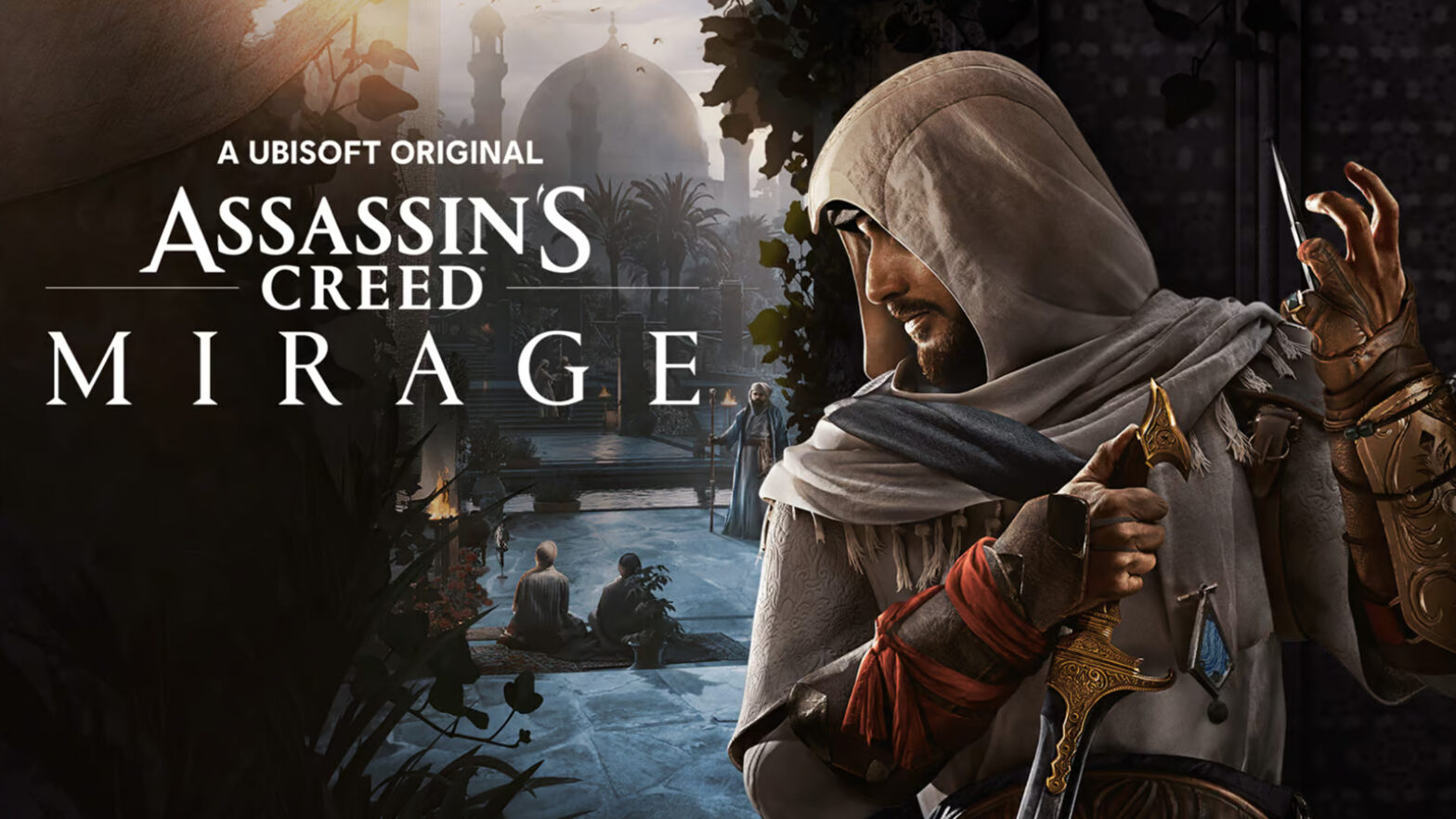You'll love it if:
- You loved Valhalla and want to learn more about Basim
- You’re looking for a short and sweet action-adventure game
- You’re a fan of pre-Unity Assassin’s Creed games
Not for you if:
- You’re completely tired of Assassin’s Creed
- You’re not a fan of stealth games
- You prefer games with a modern setting
The Assassin’s Creed series has stagnated lately. While the franchise is bigger than ever, it has strayed far from its roots. The first Assassin’s Creed was a spiritual spin-off of Prince of Persia with a unique spin – what if we could access our ancestors’ memories by exploring our DNA?
It’s a novel sci-fi idea, and players worldwide agreed, with the series’ sales passing 200 million in 2022. So, what happened? Fans universally agree that the series needed to go back to what made it successful in the first place. They wanted a tight stealth action experience that doesn’t overstay its welcome. And to everyone’s surprise, Ubisoft decided to deliver.
Assassin’s Creed Mirage is the 13th game in a long-running series that had its ups and downs over the years. Developed by Ubisoft Bordeaux, the game doesn’t try to revolutionize the series or reinvent the wheel. Instead, it goes back to what made Assassin’s Creed appealing in the first place.
TL;DR
Assassin’s Creed Mirage takes a step back and strips down everything that made the past games tedious and time-consuming. There is no levelling or gear score, and you can assassinate just about anyone with a single strike. It’s a straightforward narrative experience that will take you 20-30 hours to complete. And when you complete it, you’ll want more of it. It’s the highest praise a modern Assassin’s Creed game could get since the series shifted toward RPG gameplay.
Story – A Thief Destined for Greatness
Narratively, the Present Day story of Assassin’s Creed Mirage takes place after Assassin’s Creed Valhalla. However, its Animus story takes place before, as we explore the early years of Basim Ibn Ishaq, as he becomes a Master Assassin and the character we know from Assassin’s Creed Valhalla. Basim quickly became a fan-favourite character with an intriguing background and a vendetta for someone who wronged him in the past.
As Assassin’s Creed Mirage begins, Basim is a street thief, no more than a child trying to survive on the harsh streets of Baghdad. Given what we know of him from the previous game, it’s an interesting hook to have us play out his origins firsthand. Likewise, we’re curious what part he’ll play in the future of Assassin’s Creed, given that multiple exciting projects are on the way from Ubisoft.
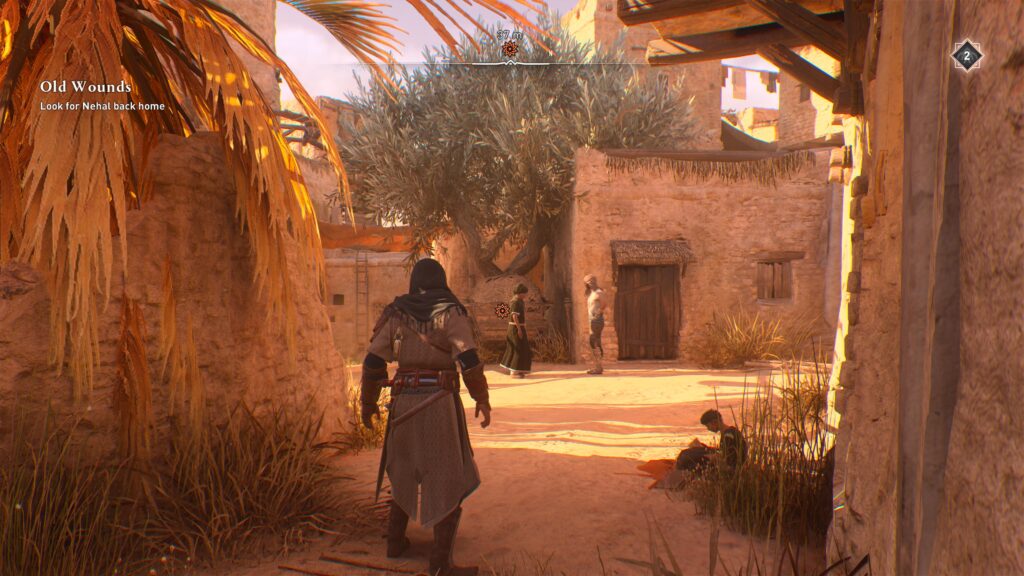
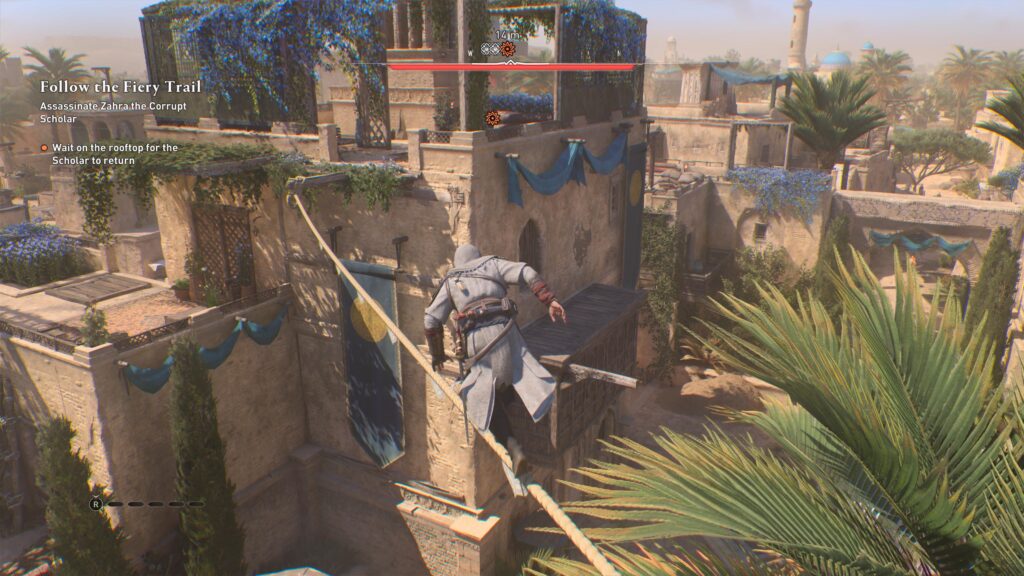
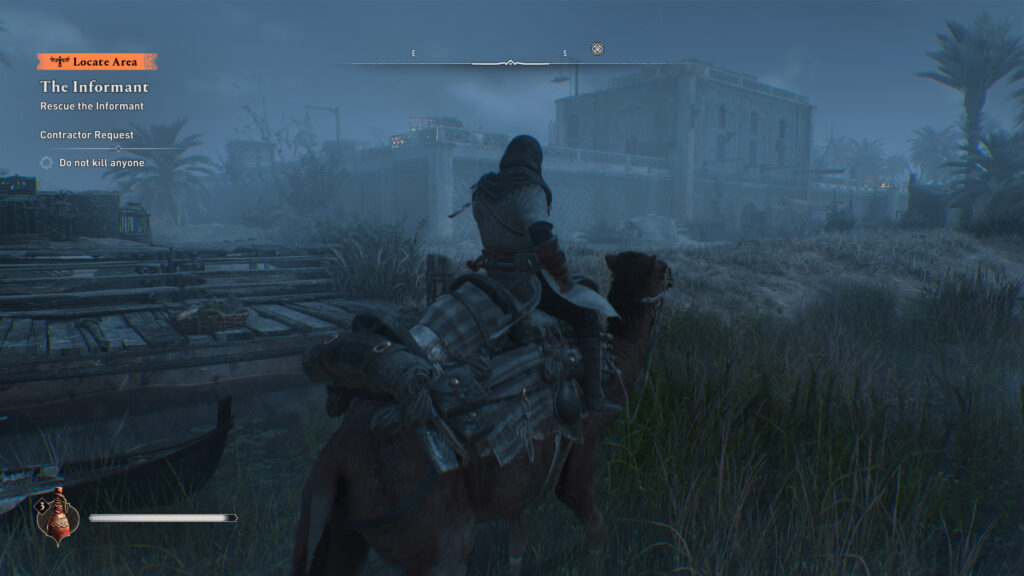
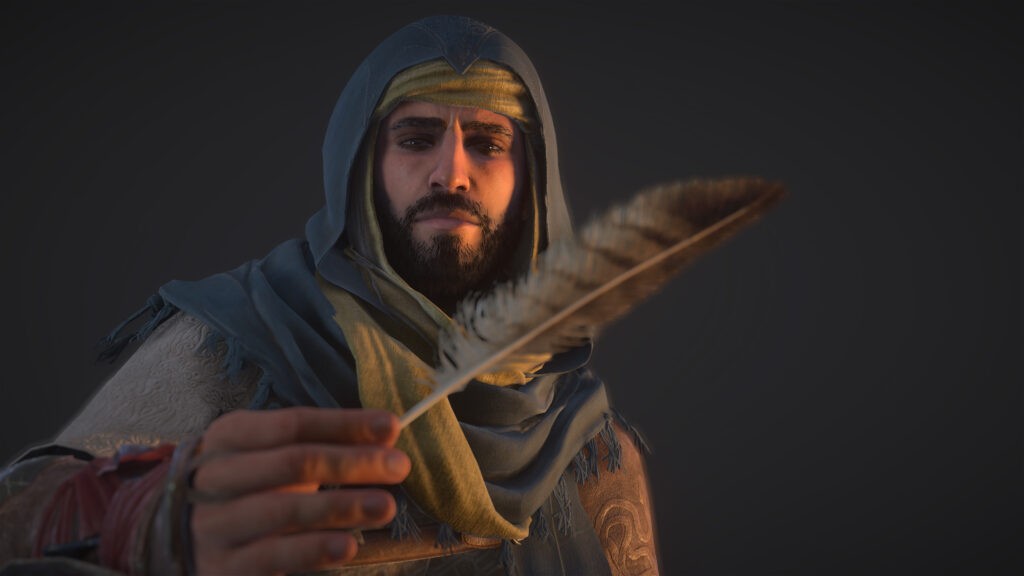
Welcome to Baghdad
The real character of Assassin’s Creed Mirage is the city of Baghdad itself. This is the smallest game in the series in a long time, and it’s something of a relief. The game’s world is divided into five areas, four for the city itself and one for the wilderness around it–that’s it. Despite its smaller scale, Baghdad is bursting with life. NPC’s from all walks of life populate the streets, from travellers to locals doing their daily chores.
You’ll never grow bored exploring the city because it’s visually interesting and allows for enjoyable parkour anywhere you go. Contrary to Assassin’s Creed Valhalla and its countryside villages, Baghdad has impressive architecture, temples, bazaars, and palaces for you to climb. Scattered throughout the world, you’ll also find tidbits of historical information about certain buildings, professions, religions, etc. If there’s one thing that Ubisoft has perfected, it’s their ability to breathe life into any world they create.
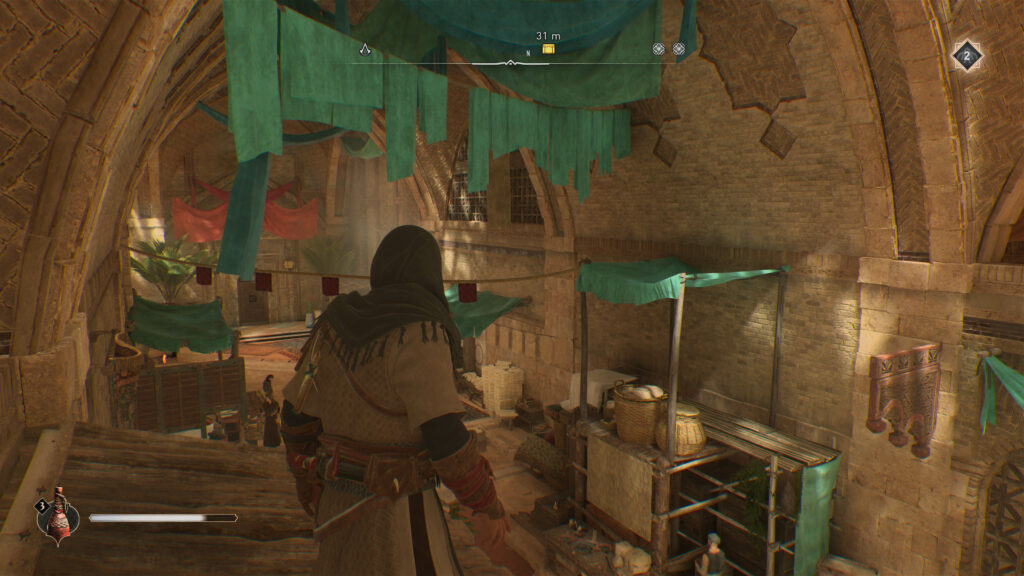
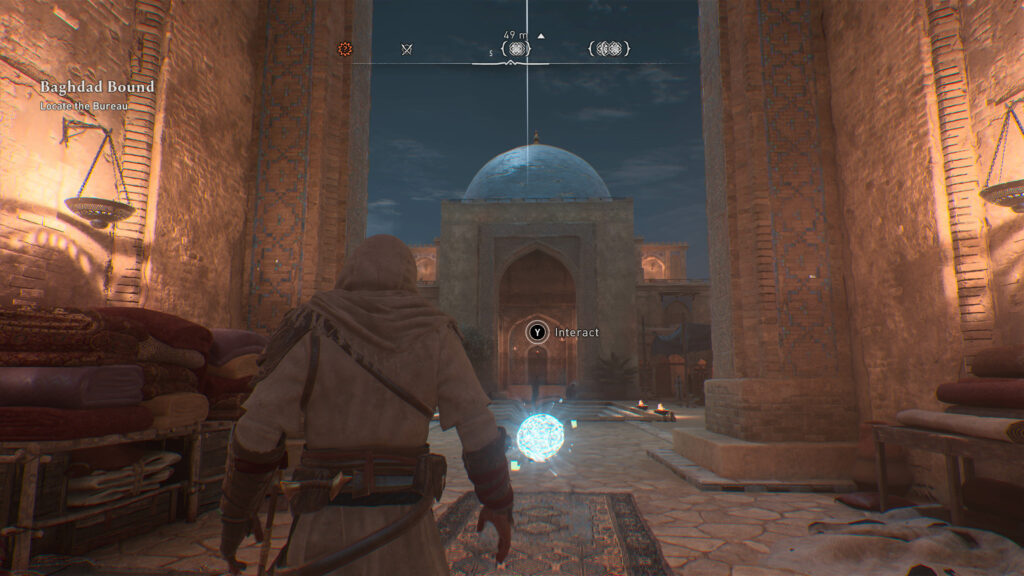
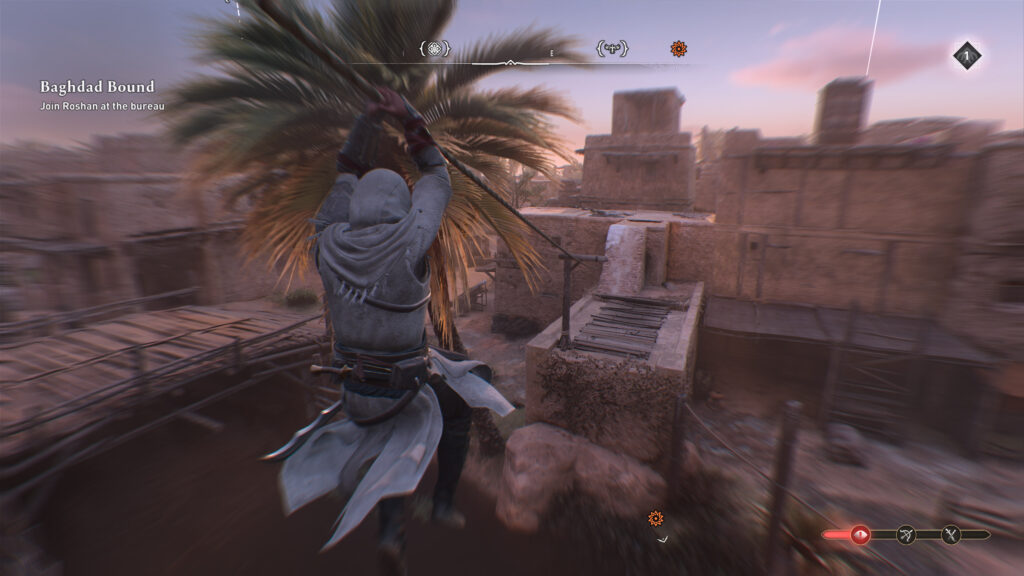
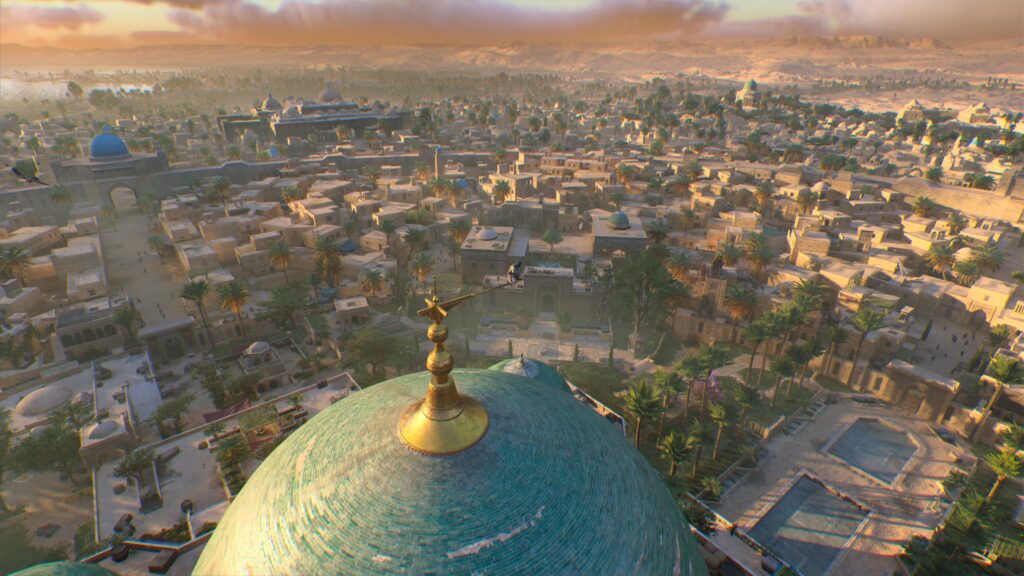
Gameplay – Return to the Series’ Roots
As soon as you start playing Assassin’s Creed Mirage, you’ll notice that something feels strange. There are fewer UI elements than there have been for a while. Mirage is a love letter to what came before while teasing what the future might hold for the series.
Thanks to its setting, it feels like the first Assassin’s Creed did back in 2007. With the return of Black Box assassination missions, it also takes the best parts of Assassin’s Creed Unity and presents them in a brand-new way. With the Black Box system, you have an opportunity to complete the mission in several different ways. This makes replaying the same assassinations a joy, similar to what the Hitman series has been doing for a few years now. It’s a step in the right direction for the series to mix and match different elements that “worked” from previous titles and present them in a new way.
Assassin’s Creed Mirage focuses on investigations (the game’s version of quests). You’ll explore different districts looking for clues about your next target, and when you’re ready, the assassination can begin. Each assassination can be completed in several unique ways, but like everything else in the game, there are only a few of them (five total). Apart from the main assassinations, mission variety is very healthy and creative–you’ll rarely do the same type of mission twice in a row.
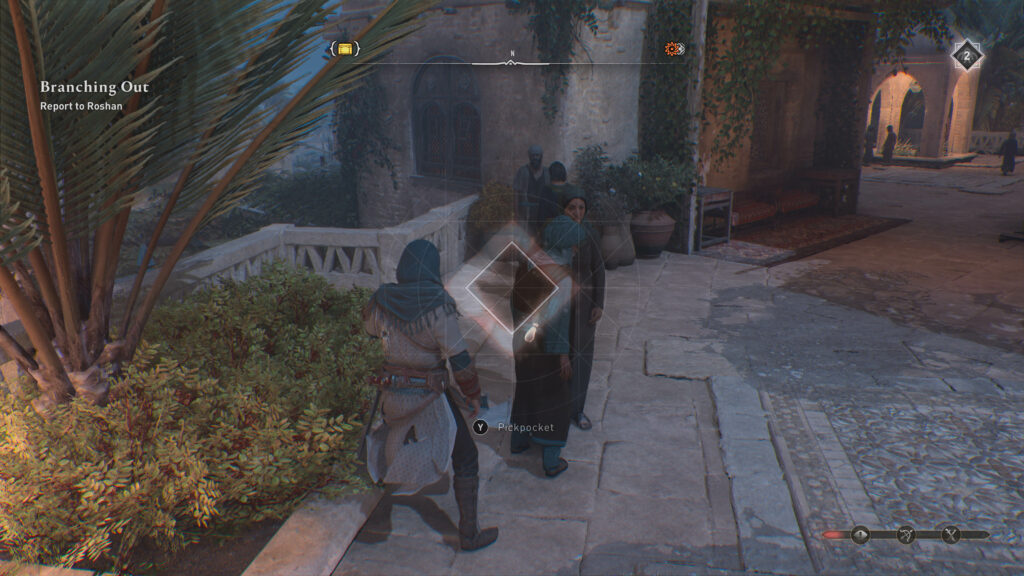
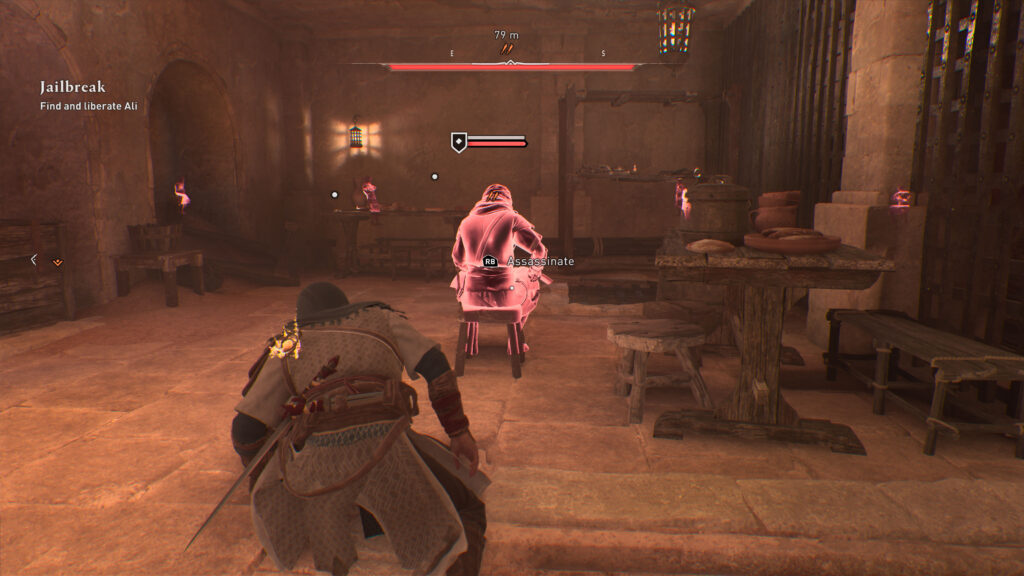
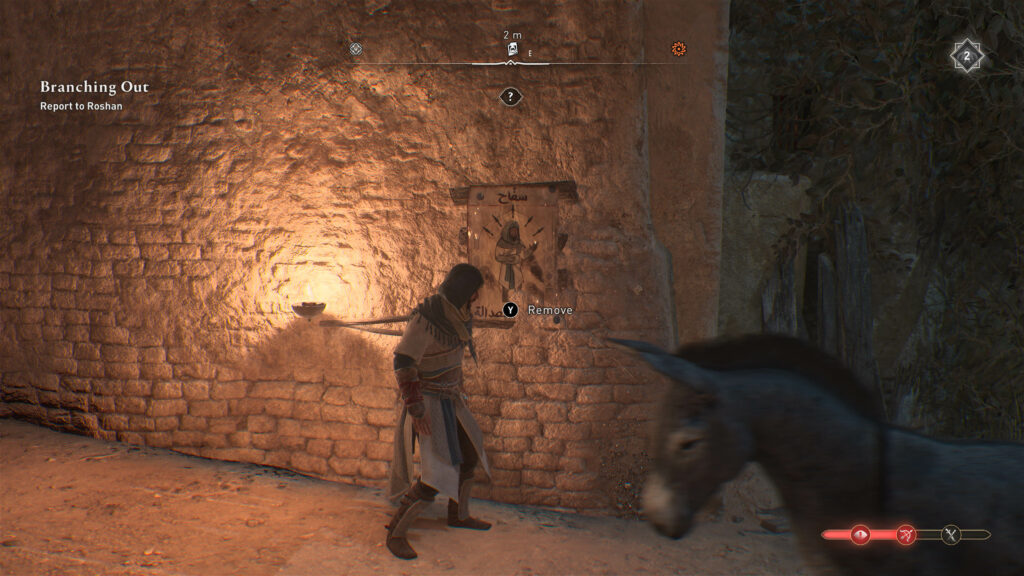
A Vulnerable but Versatile Protagonist
Basim is not an ancient god in disguise like Kassandra or Eivor before him. While his story takes a sci-fi turn (especially if you’ve played Valhalla and know his future), he is very vulnerable in Assassin’s Creed Mirage. Often, only three or four hits from an enemy will kill you. Fighting more than two or three enemies at a time? It’s best to run away and look for opportunities to level the playing field.
It’s honestly so refreshing to play an Assassin’s Creed game and finally be able to say, “This is a stealth game”. While you are vulnerable, you have plenty of useful tools in your arsenal to fight with. Smoke bombs, poison darts, throwing knives, and other gadgets all make a return. You can also ask various mercenaries, merchants, and other groups for help while you’re out on missions. They can distract enemies and draw them away from your target or make it easier for you to pass by unnoticed.
Your trusty eagle returns from the RPG trilogy but is also more vulnerable than ever. Enemy archers can shoot him down, and he’ll be unavailable for a few minutes, for example. Overall, there is a lot of strategizing to do in Assassin’s Creed Mirage, which is more than welcome for a franchise with “Assassin” in the title.
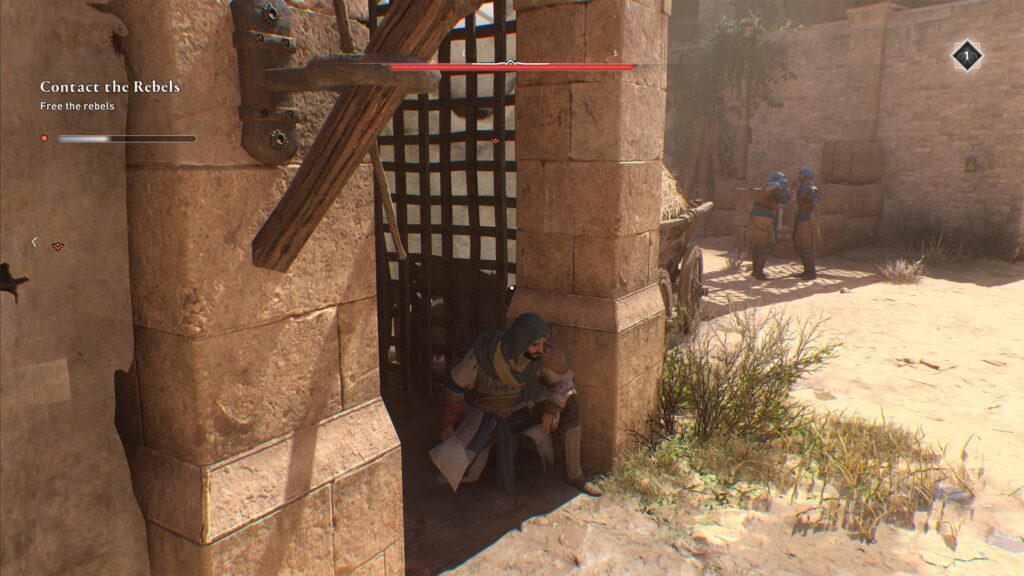
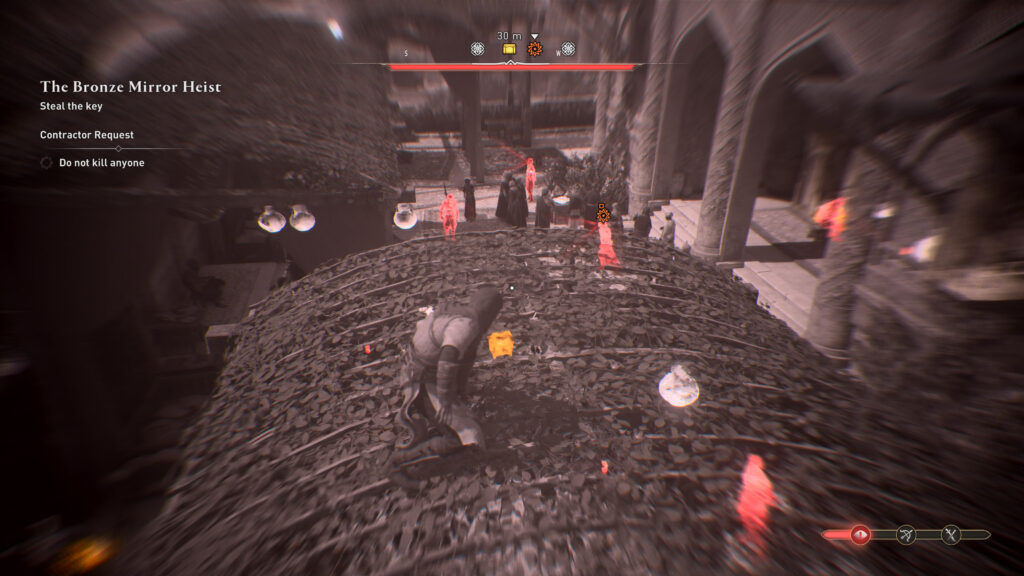
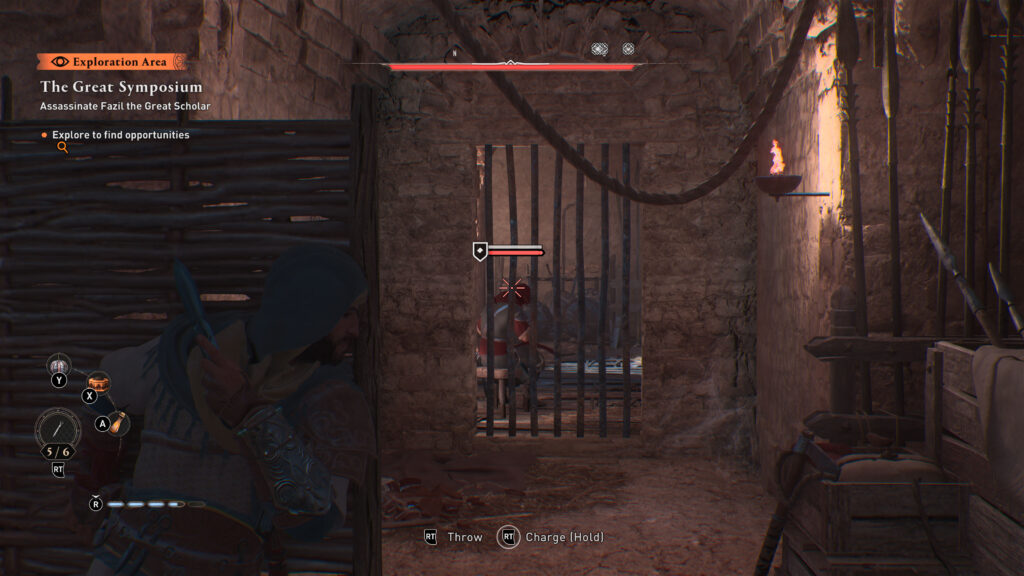
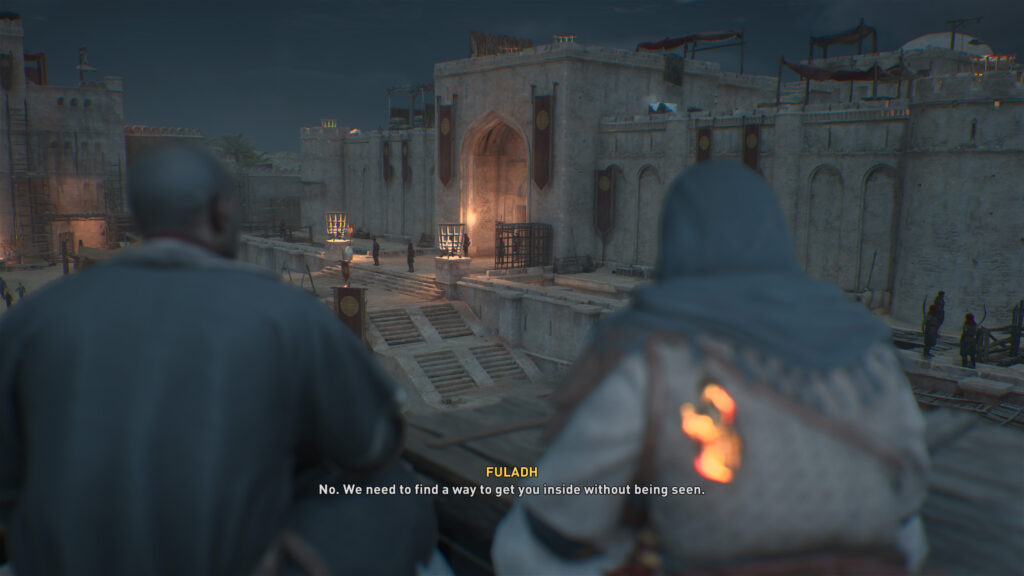
Fewer Things to Do This Time Around
Everything about Assassin’s Creed Mirage is called back and dialled down. Many of the series’ mechanics are gone, such as ship combat, a staple since Assassin’s Creed IV: Black Flag. You won’t build your base in Mirage, nor will you spend dozens of hours hunting for hundreds of monotonous collectables. Each of the game’s five districts can be completely cleared in an hour or two per area, making for a breezy, enjoyable exploration experience.
How you upgrade your equipment and learn new skills has also been revamped. The dreaded gear score system from games like Diablo IV has been removed completely. You’ll find two upgrade recipes per item and learn new skills by gaining points from specific investigations–that’s it.
It’s honestly refreshing to just be able to go straight to the centre of the map (Baghdad’s palace, the game’s most dangerous area) and simply explore without being 30 levels below the enemy. While the game has a microtransaction system in place, it looks like it’ll be mostly cosmetic, but the in-game shop was closed at our review.
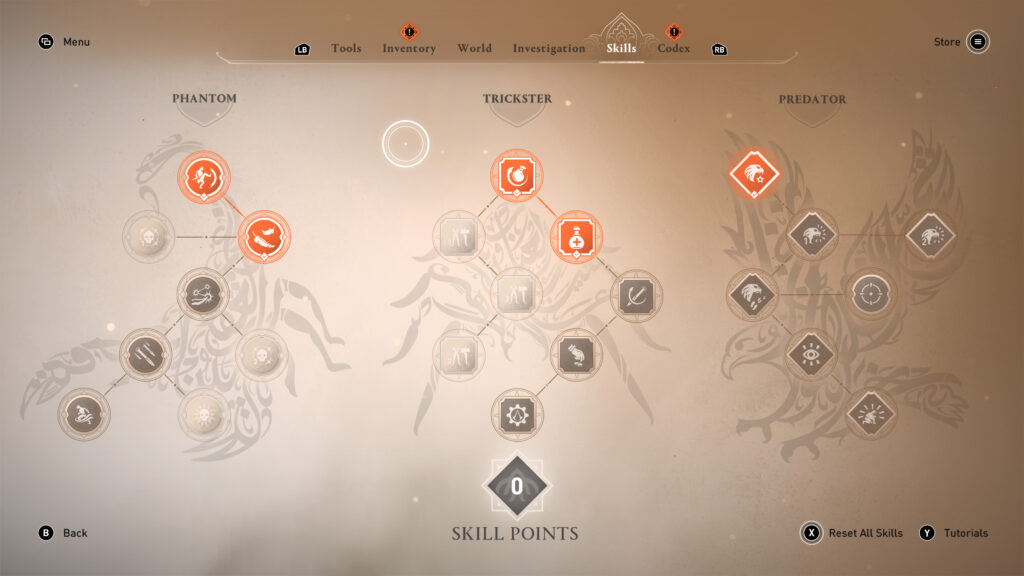
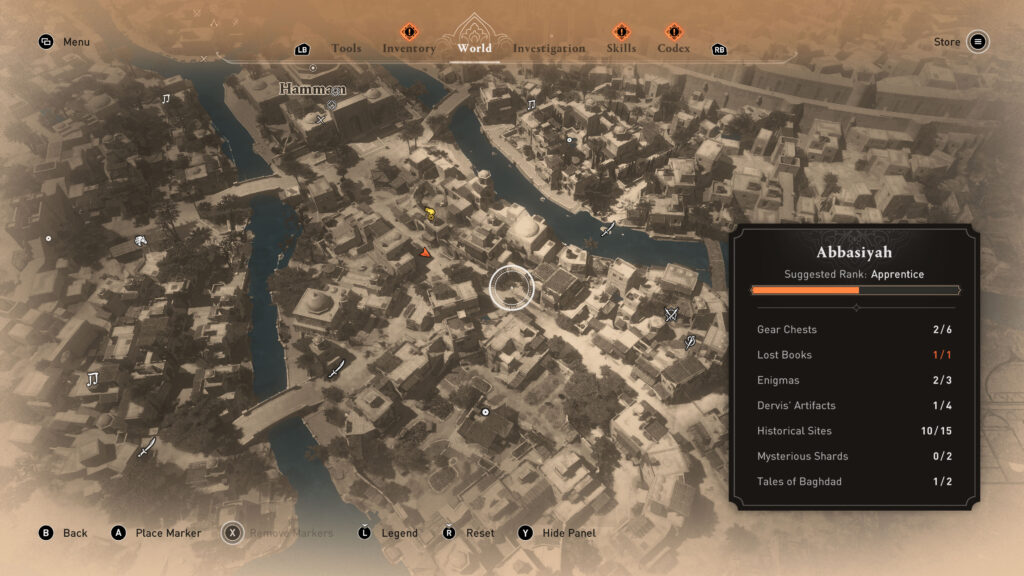
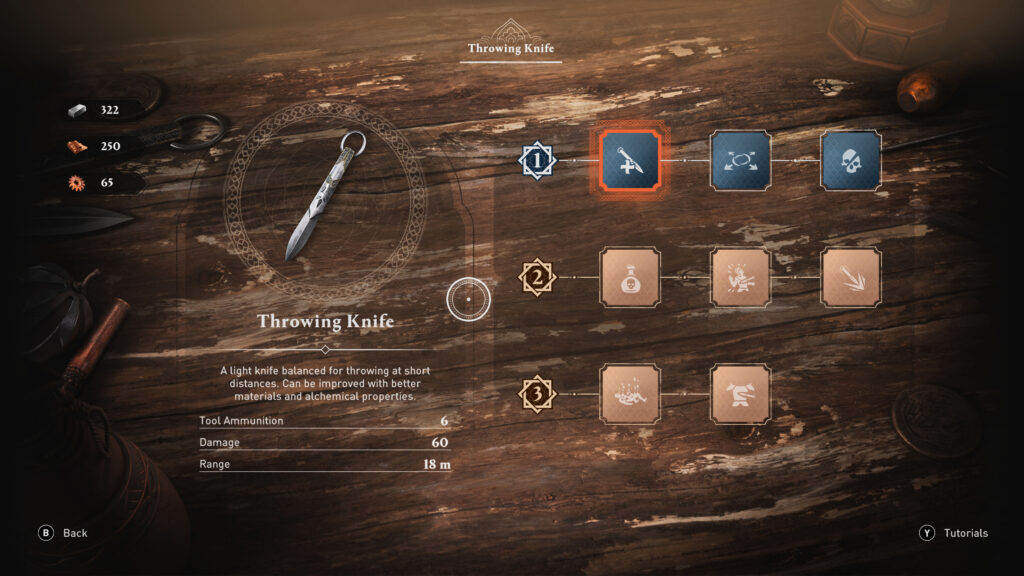
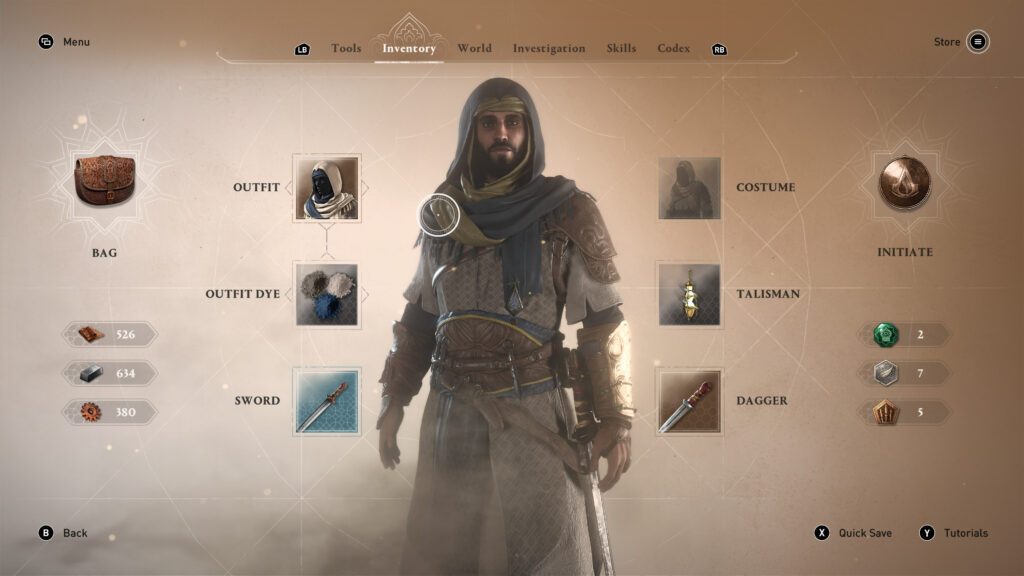
Visuals – The Ancient City Comes to Life
If you’re a Middle Eastern history, architecture, and culture fan, you’ll adore Assassin’s Creed Mirage. Despite its smaller scale, Ubisoft Bordeaux spared no expense in meticulously recreating the game’s historical setting. Each of the four districts of Baghdad feels distinct in their architecture, citizens, guard presence, and other small details that make them come to life.
Animal life is especially impressive in Assassin’s Creed Mirage, as you’ll come across flamingos flying over you in the wilderness, bunnies and chickens running around the streets of Baghdad, and plenty of horses and camels for you to use as mounts. They give the world a much-needed feeling of being lived in and not simply a map for you to explore.
While the game’s ambience is awe-inspiring, its character models are less so, specifically in their facial expressions. Despite them wearing intricate, vivid clothing, jewels, and accessories, their facial expressions are stilted. Basim, Roshan, and a few other notable characters are the exception, while everyone else looks like a generic NPC from an RPG.
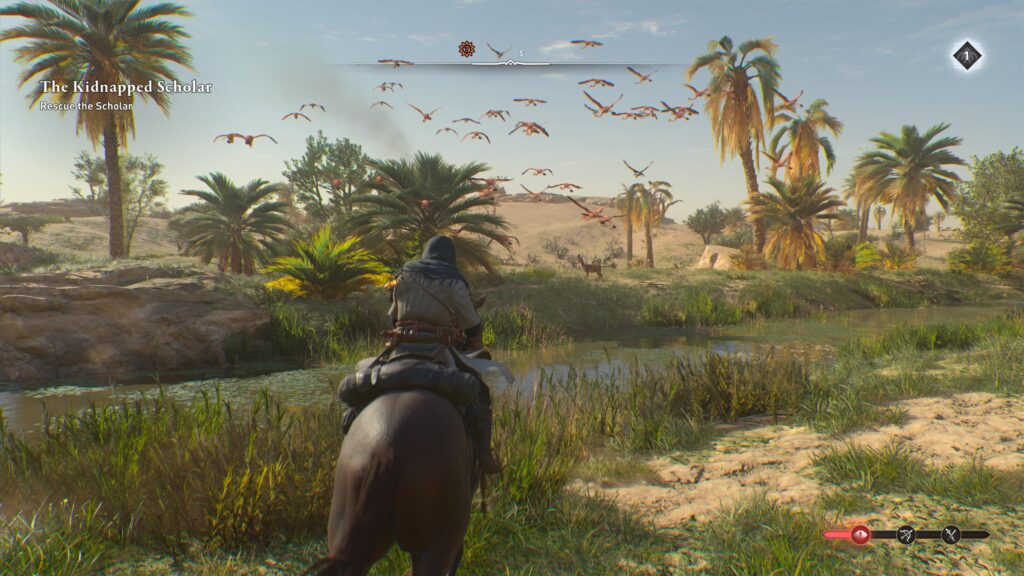
Smaller Scope with the Same Technical Wrinkles
Assassin’s Creed Mirage relies on Ubisoft’s in-house Anvil engine, which shows for better and for worse. Ubisoft Bordeaux managed to recycle many of the assets built for Assassin’s Creed Origins while also creating plenty of new content to bring 9th-century Baghdad to life.
We’ve tested the game on Xbox Series X, which sports a 30FPS Quality mode and a 60FPS Performance mode. While both modes are stable enough, Assassin’s Creed Mirage suffers from screen-tearing, issues with geometry (interacting with the environment), as well as AI bugs. These are old news, as the same kinds of glitches were present in Assassin’s Creed Valhalla.
Parkour has been a staple of Assassin’s Creed since day one and has been at its best in Assassin’s Creed Unity. Since Basim can no longer climb any surface as in the RPG trilogy but only pre-designed spots on the map, he’ll often get stuck trying to connect with a ledge or a wall. Given that Assassin’s Creed Mirage is a smaller game in every respect (including a lower launch price tag), we never expected it to revolutionize parkour. That task is up to Assassin’s Creed Codename Red and Assassin’s Creed Codename Hexe.
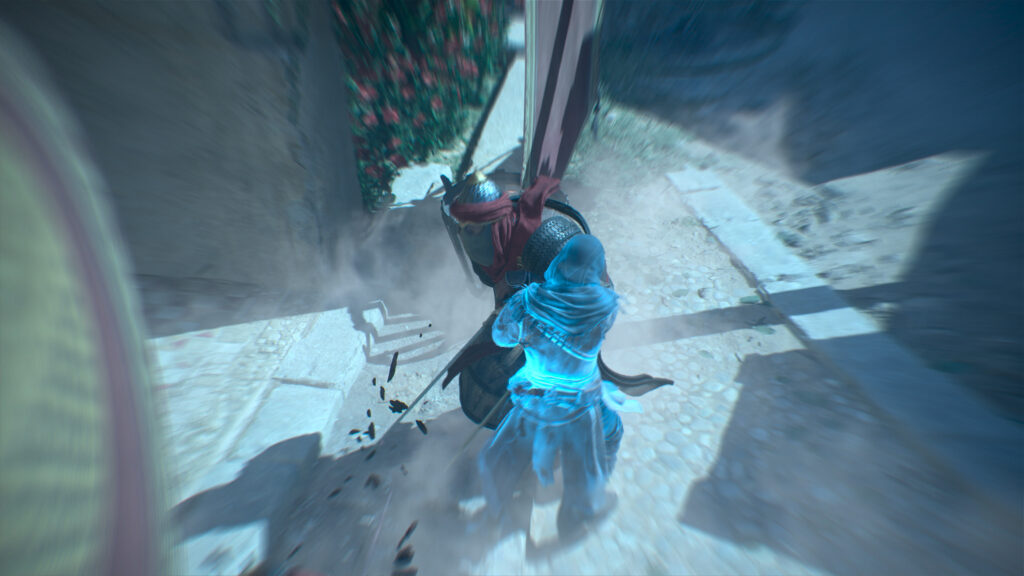
Audio – A Commitment to Authenticity
Ubisoft was always committed to making sure that every Assassin’s Creed game feels authentic to the setting it takes place in. The same can be said for Assassin’s Creed Mirage, as the game features fully-voiced Arabic dubbing if that’s how you’d like to play the game.
While that means you’ll spend a lot of time reading the subtitles, the immersion factors are amplified tenfold thanks to professional, era-appropriate voice-acting. Assassin’s Creed Mirage also features typically high-quality English voice acting, as you’d expect from the series. Basim’s teacher, Roshan, is played by Shohreh Aghdashloo (The Expanse, Mass Effect), and her presence is always a plus in any media.
Beyond that, the city of Baghdad simply sounds “alive” as you explore it. You’ll hear merchants haggling in the market, citizens cleaning their rugs on the streets, guards on their patrols, and street thieves doing what they do best. If you play Assassin’s Creed Mirage, close your eyes. As you listen to the city around you, you’ll come to appreciate Ubisoft Bordeaux’s work on the title so much more.
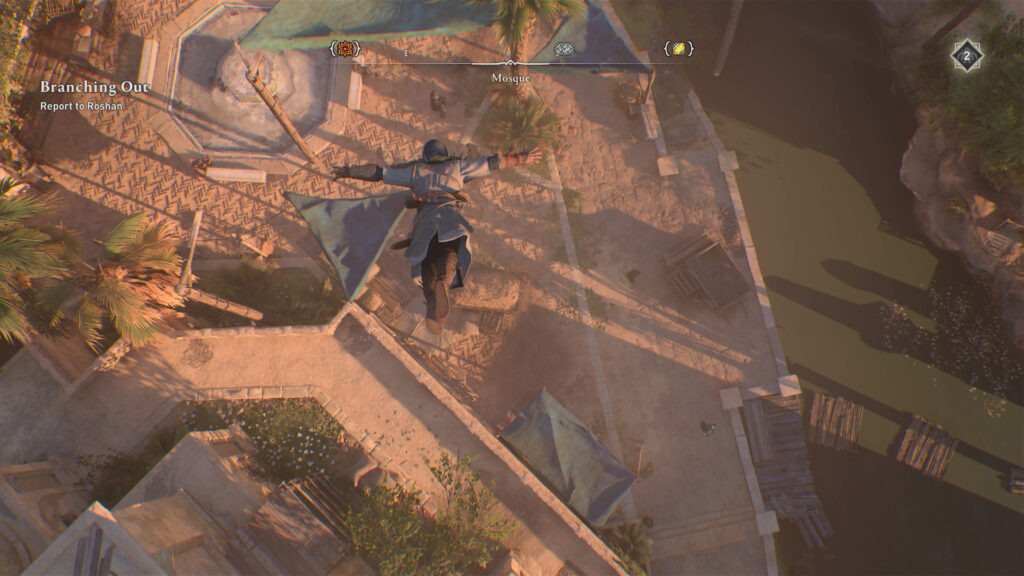
A Mix of Middle Eastern and Modern Influences
Soundtracks are where Assassin’s Creed games have always shined, especially when Jesper Kyd worked on them. Assassin’s Creed Mirage has Brendan Angelides as its composer, and he did a tremendous job in capturing the vibe of 9th-century Baghdad. Classical instruments are seamlessly mixed in with modern electronic influences to create the atmosphere of a proper Assassin’s Creed game. After all, it’s a series with various historic settings mixed in with sci-fi elements.
The series’ main music track, Ezio’s Family, also gets a new Mirage-inspired version here, and it sounds just as memorable as the original. Assassin’s Creed Mirage only lacks ambient music, as exploring Baghdad and its surroundings feels too quiet. When guards are chasing you or when you’re fighting a group of enemies, however, exciting electronic music kicks in, and you’ll forget all about the peace and quiet of exploration.
Conclusion – Should you Play Assassin’s Creed Mirage?
What does the future of Assassin’s Creed look like? Assassin’s Creed Mirage is an outlier if Ubisoft’s announcements are to be believed. The next game in the series, Assassin’s Creed Codename Red, will take place in Feudal Japan and rely on the same RPG mechanics that fans have grown to despise over the years. Will Mirage’s reception affect Codename Red in any meaningful way?
Mirage also poses an interesting question. What if Assassin’s Creed Odyssey was built as a game with a single city, Athens, and relied on similar gameplay to Mirage? Or, if Assassin’s Creed Valhalla focused solely on London? Bigger doesn’t necessarily mean better; this game is a prime example.
Whether you’re yearning for a game like Assassin’s Creed II or looking for a short but satisfying action game where you play a badass assassin, this is the game for you. We can only hope that this isn’t the last Assassin’s Creed game of its type. Assassin’s Creed Mirage launches on October 5th on PS4/5, Xbox One/Series X|S consoles, as well as PC and Amazon Luna. It will also be available on iOS in 2024 if you’re a fan of mobile gaming.
Big thanks to Ubisoft for providing us with the review copy!
